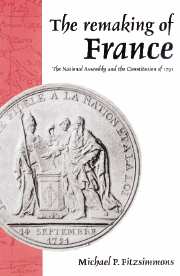Conclusion
Published online by Cambridge University Press: 14 October 2009
Summary
Our free and peaceable constitution is, then, the work of God for the happiness of man.
Speech of the priest Charles Hervier during a celebration of Louis's acceptance of the constitution, September 25, 1791Various generations of historians have tended to view the Constitution of 1791 unfavorably, albeit for different reasons. Mathiez, for example, asserted that privilege of wealth replaced that of birth, and Soboul echoed this judgment when he wrote of the French throwing off the yoke of privilege based on birth but replacing it with privilege based on money. Similar judgments have continued to the present era. Such criticisms, however, concentrate on only one aspect of the constitution and are overstated in any case.
Indeed, the degree of political involvement – in political clubs, popular societies or elections, especially the elections of 1790 – belies any notion of a plutocracy. Contemporaries clearly regarded the constitution with respect and were strongly attached to it. To most, it represented the replacement of a corporative, hierarchical society of orders and privilege by one based entirely on new principles of equity, equality and the rule of law. It is not surprising, then, that most Frenchmen viewed the work of the National Assembly so favorably. The Jacobin club of Loches, for example, wrote the following to the National Assembly in late September, 1791, after Louis's acceptance of the constitution:
Two and one-half years of work have redressed the unhappiness of fourteen centuries; in fourteen centuries the gratitude that we express to you today for the completion of so sublime a work will not yet have weakened in the hearts of the French.
- Type
- Chapter
- Information
- The Remaking of FranceThe National Assembly and the Constitution of 1791, pp. 247 - 258Publisher: Cambridge University PressPrint publication year: 1994

